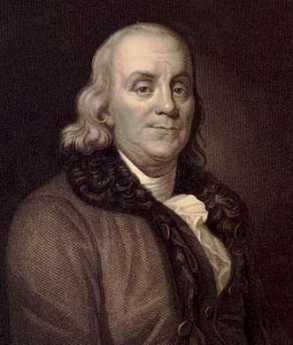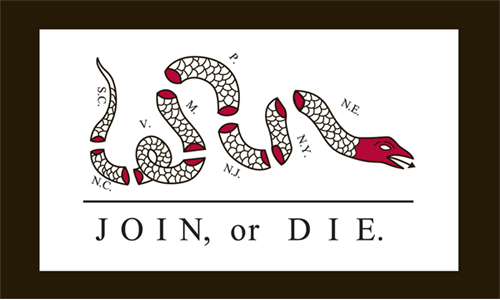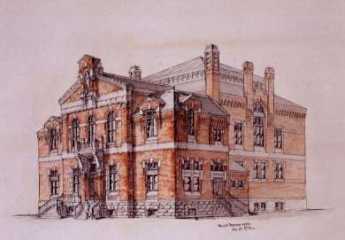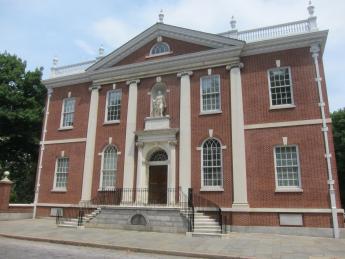Related Topics
Benjamin Franklin
A collection of Benjamin Franklin tidbits that relate Philadelphia's revolutionary prelate to his moving around the city, the colonies, and the world.

Historical Preservation
The 20% federal tax credit for historic preservation is said to have been the special pet of Senator Lugar of Indiana. Much of the recent transformation of Philadelphia's downtown is attributed to this incentive.
Curtis
To Cy Curtis, magazines were just vehicles for advertisers. In fact, his mags taught former farmers how to manage urban life, more or less accidentally creating a focus for American books, authors, politics and literature. The fall of his empire teaches the lesson that antitrust laws against vertical integration are probably unnecessary.
Academia in the Philadelphia Region
Higher education is a source of pride, progress, and aggravation.
Philadelphia Economics
economics
Literary Philadelphia
Literary
Right Angle Club 2008
A report, to the year 2008 shareholders of the Right Angle Club of Philadelphia, by the outgoing president, Neale Bringhurst...
Favorites - II
More favorites. Under construction.
Thinking About Thought
There's a yawning gap between concepts of the mind, and concepts of brain function.
Rise and Fall of Books
| ||
| The Library Company of Philadelphia |
John C. Van Horne, the current director of the Library Company of Philadelphia recently told the Right Angle Club of the history of his institution. It was an interesting description of an important evolution from Ben Franklin's original idea to what it is today: a non-circulating research library, with a focus on 18th and 19th Century books, particularly those dealing with the founding of the nation, and, African American studies. Some of Mr. Van Horne's most interesting remarks were incidental to a rather offhand analysis of the rise and decline of books. One suspects he has been thinking about this topic so long it creeps into almost anything else he says.
 |
| Join or Die snake |
Franklin devised the idea of having fifty of his friends subscribe a pool of money to purchase, originally, 375 books which they shared. The members were mainly artisans and the books were heavily concentrated in practical matters of use in their trades. In time, annual contributions were solicited for new acquisitions, and the public was invited to share the library. At present, a membership costs $200, and annual dues are $50. Somewhere along the line, someone took the famous cartoon of the snake cut into 13 pieces, and applied its motto to membership solicitations: "Join or die." For sixteen years, the Library Company was the Library of Congress, but it was also a museum of odd artifacts donated by the townsfolk, as well as the workplace where Franklin conducted his famous experiments on electricity. Moving between the second floor of Carpenters Hall to its own building on 5th Street, it next made an unfortunate move to South Broad Street after James and Phoebe Rush donated the Ridgeway Library. That building was particularly handsome, but bad guesses as to the future demographics of South Philadelphia left it stranded until modified operations finally moved to the present location on Locust Street west of 13th. More recently, it also acquired the old Cassatt mansion next door, using it to house visiting scholars in residence, and sharing some activities with the Historical Society of Pennsylvania on its eastern side.
 |
| Old Pictures of the Library Company of Philadelphia |
The notion of the Library Company as the oldest library in the country tends to generate reflections about the rise of libraries, of books, and publications in general. Prior to 1800, only a scattering of pamphlets and books were printed in America or in the world for that matter, compared with the huge flowering of books, libraries, and authorship which were to characterize the 19th Century. Education and literacy spread, encouraged by the Industrial Revolution applying its transformative power to the industry of publishing. All of this lasted about a hundred fifty years, and we now can see publishing in severe decline with an uncertain future. It's true that millions of books are still printed, and hundreds of thousands of authors are making some sort of living. But profitability is sharply declining, and competitive media are flourishing. Books will persist for quite a while, but it is obvious that unknowable upheavals are going to come. The future role of libraries is particularly questionable.
Rather than speculate about the internet and electronic media, it may be helpful to regard industries as having a normal life span which cannot be indefinitely extended by rescue efforts. No purpose would be served by hastening the decline of publishing, but things may work out better if we ask ourselves how we should best predict and accommodate its impending creative transformation.
www.Philadelphia-Reflections.com/blog/1470.htm
Originally published: Friday, June 13, 2008; most-recently modified: Friday, September 20, 2019
| Posted by: Slide | Aug 6, 2010 4:54 PM |
